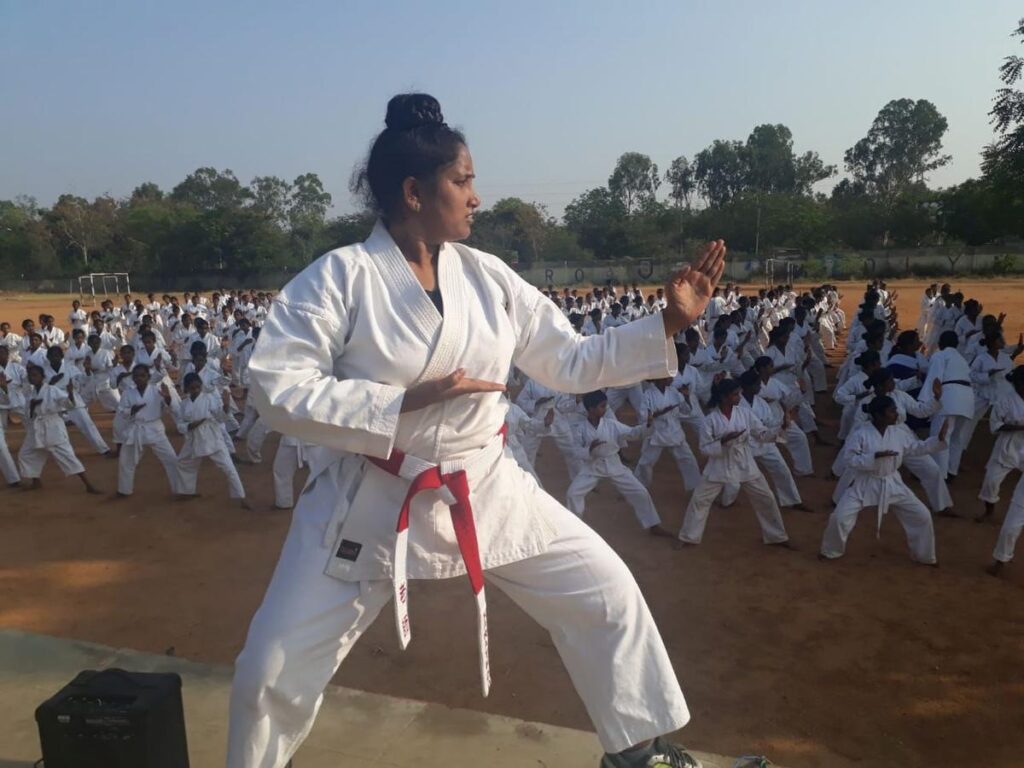Born blind, Nara Venkata Ratnam dreamed of his daughter becoming a police officer. Working tirelessly as a farmer, Ratnam continued to lead a normal life despite the odds. This determination was also echoed by his daughter Lakshmi Samrajiyam, who shared her father's dream of joining the police force. Lakshmi's journey to celebrity status is remarkable, considering she was unable to fulfil her childhood dream of becoming a police officer. Nevertheless, she was recognised for her expertise in teaching martial arts to police officers through her Rudramadevi Self-Defence School.
“My father always wanted me to become a police officer. He always told me to salute any police officer I met and he had some friends who were police officers. He was a liberal, positive person and he always encouraged us.”
Life Impact
Lakshmi Samrajyam | Photo Credit: Special Arrangements
Born in Garimenapenta, a small village in Prakasam district of Andhra Pradesh, Lakshmi says she was naive and shy as a child. “The turning point came in my 10th class when one of my friends was being harassed by a boy and I decided that I should take up martial arts not only for self-defence but also to help others. I knew I had to become stronger.” Lakshmi moved to Ongole for her secondary education. She was inspired by the films of actor Vijayashanti. Neti Bharatam and KartaviyamHer desire to become a police officer was further strengthened after watching “The Police.” “I've probably seen 100 other movies, but those are still the two that have had the most impact on me,” she says.
She began training under Master Ravi at the Dragon Martial Arts School in Ongole, where she earned her black belt. “While training, I started teaching other students, which helped me earn money and cover my school fees,” she says. She completed her undergraduate and postgraduate studies at Andhra University.
Despite her rigorous training and dedication, Lakshmi suffered a major setback when she was unable to pass the written exam required to become a police officer due to her lack of fluency in English. But a meeting with training instructor Arvind Rao changed her course. He recognised her passion and skills and initiated her into police training. “I started my police training in 1998 and felt like I had made it in my own way,” she says proudly.
Fighting Resistance
Lakshmi's migration to Hyderabad in 2004 marked the beginning of a new chapter. She began training police officers at the Police Academy and home guards at the Goshamahal Grounds. Initially, schools were reluctant to introduce martial arts training, especially for girls. But her persistence paid off, and today, martial arts training is compulsory in all government schools in Telangana. “Inspired by Rudrama Devi's bravery, in 2014, I formally founded the Rudrama Devi Academy,” she explains. Despite being forced to close her rented academy space during the COVID-19 pandemic, she now uses the government premises to train students at her school.
Lakshmi's numerous achievements in martial arts have earned her international acclaim, advanced training in Malaysia and Sri Lanka and she has received consecutive International Women's Day honours.
In Telangana, Lakshmi's impact goes beyond training police officers. She conducts camps and workshops for Anganwadi teachers and DWCRA women, and provides free services for orphans. She works with the SHE team (Telangana Police Women Safety Initiative) to organize events and create awareness on self-defense in schools and colleges, which has significantly increased her visibility and influence. “Contributing to the police station is a big thing for me,” she says. She values her role so much that she does not ask the SHE team for any advance payment, only taking it when the funds are in hand.
In the future, Lakshmi dreams of setting up a permanent academy that offers residential training: “I want the Rudrama Devi Academy to survive me and enable its students to earn a living and mentor others.”
This is a premium article available only to subscribers. To read over 250 premium articles every month,
You've reached your limit for free articles. Support quality journalism.
You've reached your limit for free articles. Support quality journalism.
You have read {{data.cm.views}} from {{data.cm.maxViews}} Free articles.
This is the last free article.

